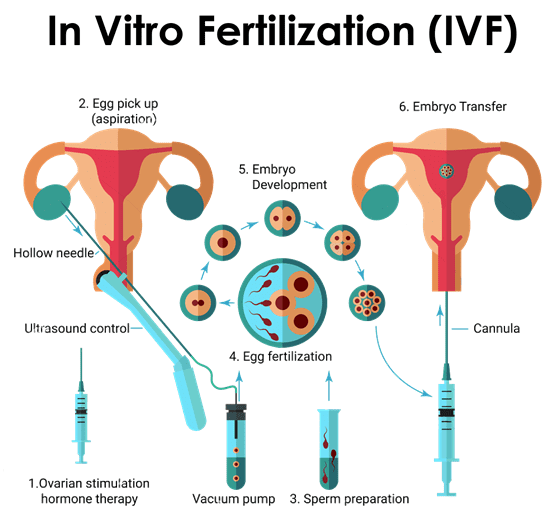What is IVF (In Vitro Fertilization)?
In Vitro Fertilization (IVF) is one of the most common and effective assisted reproductive technologies (ART) used to help couples and individuals who are struggling with infertility. It involves fertilizing an egg outside the body and then implanting the resulting embryo(s) into the woman’s uterus. IVF is often considered when other fertility treatments have not been successful, or when there are specific fertility issues that cannot be treated with less invasive methods.
IVF has revolutionized the treatment of infertility, offering hope for many people facing challenges with conception. It is used to treat various fertility conditions, including ovulatory disorders, male infertility, fallopian tube damage, unexplained infertility, and age-related fertility decline.
The IVF Process: A Detailed Step-by-Step Guide
The IVF procedure involves several stages, each designed to optimize the chances of success. Here’s an in-depth look at the process:
1. Initial Consultation and Fertility Assessment
Before beginning an IVF cycle, patients undergo a detailed consultation with a fertility specialist. This initial assessment may include:
- Medical History Review: The doctor will evaluate your health, lifestyle, and any underlying conditions that may be affecting fertility.
- Diagnostic Tests: Both partners may undergo tests such as semen analysis for men, and hormonal testing, ultrasounds, or hysterosalpingography (HSG) for women to assess ovarian function and reproductive health.
2. Ovarian Stimulation (Egg Retrieval)
- Stimulation: To produce multiple eggs, the woman undergoes ovarian stimulation. This involves taking hormone injections for about 10-14 days to encourage the ovaries to produce multiple eggs rather than the usual single egg produced each month.
- Monitoring: During this phase, the doctor monitors the response to medication through blood tests and ultrasounds to ensure optimal egg development.
- Trigger Shot: When the eggs are mature, a "trigger shot" (hCG) is given to induce ovulation, signaling the ovaries to prepare the eggs for retrieval.
3. Egg Retrieval (Aspiration)
- Procedure: About 36 hours after the trigger shot, eggs are collected in a minor surgical procedure called egg retrieval or aspiration. Under sedation or anesthesia, a thin needle is inserted into the ovaries through the vaginal wall to collect the eggs.
- Recovery: The procedure typically takes around 20-30 minutes. Patients usually rest for a short time afterward, and most can return to their normal activities the next day.
4. Fertilization
- Laboratory Process: The collected eggs are fertilized in the laboratory using sperm from the male partner or a sperm donor. There are two primary methods for fertilization:
- Conventional IVF: Sperm is mixed with the eggs in a culture dish and fertilization occurs naturally.
- ICSI (Intracytoplasmic Sperm Injection): If male infertility is an issue, a single sperm is injected directly into an egg to facilitate fertilization.
- Embryo Development: The fertilized eggs are monitored over the next 3-5 days as they develop into embryos.
5. Embryo Transfer
- Embryo Selection: After 3-5 days of culture, the best-quality embryos are selected for transfer into the woman’s uterus. The number of embryos transferred depends on factors like age, embryo quality, and medical history.
- Procedure: The embryo transfer is a simple and painless procedure where a thin catheter is used to place the embryo(s) in the uterus. No anesthesia is required, and the procedure typically takes only a few minutes.
- Post-Transfer Care: After the embryo transfer, the woman may be advised to rest for a short period. Bed rest is not typically required, but certain activities should be avoided for a few days.
6. Pregnancy Test and Follow-Up
- Pregnancy Test: About 10-14 days after the embryo transfer, a blood test is performed to check for pregnancy. If successful, an ultrasound will be scheduled to confirm the pregnancy and check for a heartbeat.
- Follow-Up Care: If the pregnancy test is positive, follow-up ultrasounds will monitor the growth of the embryo. If the test is negative, the doctor will discuss next steps, including possible embryo freezing for future use or planning for another IVF cycle.
Success Rates of IVF
Success rates for IVF can vary based on factors like age, the cause of infertility, and the quality of embryos. Generally, women under 35 have the highest success rates, with around 40-50% success per cycle. Success rates decrease as the woman’s age increases, particularly after 40. However, new technologies like genetic screening (PGT) and improved culture conditions have helped increase success rates.
Factors Influencing IVF Success
- Age: The age of the woman (especially ovarian reserve) plays a significant role in the success of IVF. Younger women tend to have higher success rates.
- Egg Quality: The quality of the eggs used in IVF is a critical factor in the outcome. Egg freezing is an option for women who want to delay motherhood but preserve their fertility.
- Embryo Quality: Higher-quality embryos are more likely to implant successfully. Advanced technologies like genetic testing (PGT) can help select the healthiest embryos.
- Sperm Quality: Male factor infertility can affect IVF success. ICSI is often used for men with low sperm count or poor sperm motility.
IVF with Egg Donation or Surrogacy
For women who cannot produce viable eggs or for women over 40, egg donation may be an option. In cases of uterine issues, surrogacy can be considered, where another woman carries the pregnancy for the intended parents.
Risks and Side Effects of IVF
While IVF is generally safe, like any medical procedure, it carries risks:
- Ovarian Hyperstimulation Syndrome (OHSS): A condition where the ovaries become swollen and painful due to an overreaction to fertility drugs.
- Multiple Pregnancy: IVF often results in multiple embryos being transferred, which increases the risk of twins or triplets.
- Ectopic Pregnancy: A rare complication where the embryo implants outside the uterus, usually in the fallopian tube.
- Infection: Though rare, infections can occur after the egg retrieval or embryo transfer.
- Emotional Stress: IVF can be emotionally taxing, as it involves hope and disappointment, depending on the outcome. Counseling and support groups can help manage the emotional toll.
Alternative Fertility Treatments
If IVF is not successful, several alternative treatments might be considered:
- IUI (Intrauterine Insemination): A simpler, less invasive fertility treatment where sperm is directly injected into the uterus during ovulation.
- Fertility Medications: Medications such as Clomid or gonadotropins may be used to stimulate ovulation, often combined with IUI.
- Egg Freezing: Women who wish to delay pregnancy can freeze eggs for future use.
- Donor Sperm or Eggs: If the male or female partner has fertility issues, using donor eggs or sperm can be an option.
Emotional and Psychological Support
Undergoing IVF can be an emotional rollercoaster, as success or failure is often out of the patient’s hands. Many fertility clinics offer counseling or refer patients to support groups. Talking with others who are going through similar experiences can be invaluable.
IVF Process: Step-by-Step
- Ovarian Stimulation: Hormones are used to stimulate the ovaries to produce multiple eggs.
- Egg Retrieval: Mature eggs are collected from the ovaries.
- Fertilization: Eggs are fertilized in the lab using sperm from the male partner or a donor.
- Embryo Transfer: The fertilized embryos are transferred into the woman's uterus for implantation.
Infertility Treatment Options
- IVF with ICSI (Intracytoplasmic Sperm Injection): For male infertility, sperm is injected directly into an egg to aid fertilization.
- Egg Donation: Women who cannot use their eggs may opt for egg donation, where a donor's eggs are used for IVF.
- Embryo Freezing: Surplus embryos from IVF cycles can be frozen for future use.
- Egg Freezing: Women who wish to delay pregnancy can freeze their eggs for later fertilization.
Benefits of IVF Treatment
- Increased Pregnancy Chances: IVF has a higher success rate compared to other fertility treatments.
- Personalized Care: Treatments are tailored to your specific needs, improving your chances of success.
- Relief from Infertility Struggles: IVF can offer hope to couples dealing with infertility issues.
Why Choose Expert IVF & Infertility Treatment?
- Experienced Fertility Specialists: Our team consists of expert reproductive endocrinologists who specialize in IVF and infertility treatments, ensuring the highest quality of care.
- Advanced Technology: We utilize cutting-edge IVF technologies, including genetic screening and egg freezing, to improve success rates.
- Affordable Options: With cost-effective IVF solutions, we make assisted reproduction more accessible without compromising on quality.
- Comprehensive Fertility Care: From consultations to aftercare, we provide full support to help you navigate your fertility journey.
Why Choose Healthour for IVF & Infertility Treatments?
- Affordable Pricing: We offer transparent and competitive pricing for IVF treatments, making fertility care accessible.
- Expert Care: Our experienced fertility specialists use advanced techniques to give you the best chances of success.
- Personalized Approach: Each IVF treatment plan is customized to meet your unique fertility needs.
- High Success Rates: Our IVF success rates are among the highest, ensuring you receive the best possible outcome.
- Comprehensive Support: We provide continuous support throughout your treatment, from initial consultation to post-treatment care.
Steps to Start Your IVF Journey
- Consultation: Schedule an appointment with a fertility specialist to evaluate your condition and determine the best treatment options.
- Diagnosis & Testing: Comprehensive testing (hormonal, genetic, and semen analysis) will help determine the cause of infertility.
- Treatment Plan: Based on your diagnosis, a tailored IVF plan will be developed.
- IVF Cycle: Under expert care, the IVF procedure will begin, including stimulation, egg retrieval, fertilization, and embryo transfer.
- Post-Treatment Support: Regular follow-up visits ensure that you receive continuous support during the recovery process.
Contact Us for Affordable IVF & Infertility Care
If you're struggling with infertility, Healthour offers affordable and expert IVF treatments to help you achieve your dream of parenthood. Contact us today to schedule a consultation and take the first step toward building your family.
FAQs about IVF & Infertility Treatments
- What is the cost of IVF?
The cost of IVF treatments ranges from $4,000 to $15,000 per cycle, depending on various factors like clinic location and additional treatments.
- How many IVF cycles are required?
Success rates can vary, but many women achieve pregnancy within the first few cycles. On average, patients may need 1 to 3 cycles.
- What are the risks of IVF?
IVF is generally safe, but risks include multiple pregnancies, ovarian hyperstimulation syndrome, and potential complications during egg retrieval.
- How long does it take to complete an IVF cycle?
An IVF cycle typically lasts about 4 to 6 weeks, but additional cycles may be needed for some patients.
- What are the chances of success with IVF?
Success rates vary depending on age, fertility issues, and other factors. On average, IVF has a success rate of 40-50% for women under 35.
- Is IVF covered by insurance?
IVF insurance coverage varies by location and plan. It's essential to check with your provider to determine your coverage options.
- Can I freeze my eggs for later use?
Yes, egg freezing is a viable option for women who want to delay pregnancy or preserve fertility for medical reasons.
- What happens if IVF is unsuccessful?
If IVF is unsuccessful, your doctor will discuss next steps, which may include additional cycles, alternative treatments, or donor options.
- Can I live a normal life after IVF?
Yes, most patients recover quickly and return to their normal activities. IVF does not affect your long-term health or fertility unless additional medical issues arise.




